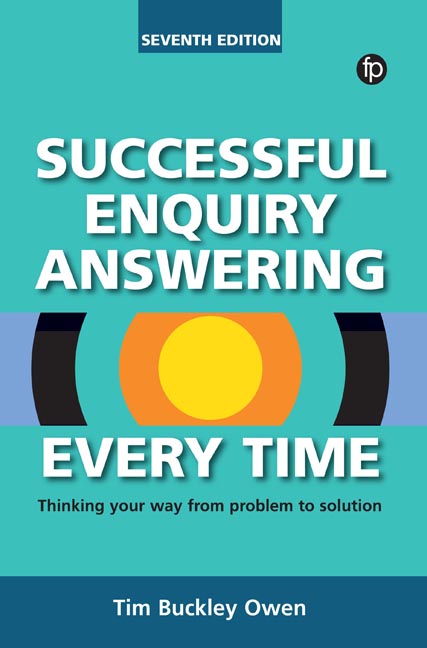Book contents
- Frontmatter
- Dedication
- Contents
- Introduction: Why thinking skills matter
- Eight essential thinking skills for successful enquiry answering
- 1 What do they really want? Using your analytical thinking skills to understand the question
- 2 Why remote enquiry handling is different Anticipating problems by thinking empathetically
- 3 Getting started Dealing with the panic by thinking imaginatively
- 4 Smarter searching Developing efficient search strategies by thinking systematically
- 5 Help! Everything's going wrong Using lateral thinking to get out of difficulties
- 6 Success! Now let's add some value Using your creative thinking skills to present your answer well
- 7 Don't just give me another reading list! Using critical thinking skills to add further value to your answer
- 8 Choosing your toolkit Using your predictive thinking skills to determine the resources you'll need
- Index
- Miscellaneous Endmatter
7 - Don't just give me another reading list! Using critical thinking skills to add further value to your answer
Published online by Cambridge University Press: 08 June 2018
- Frontmatter
- Dedication
- Contents
- Introduction: Why thinking skills matter
- Eight essential thinking skills for successful enquiry answering
- 1 What do they really want? Using your analytical thinking skills to understand the question
- 2 Why remote enquiry handling is different Anticipating problems by thinking empathetically
- 3 Getting started Dealing with the panic by thinking imaginatively
- 4 Smarter searching Developing efficient search strategies by thinking systematically
- 5 Help! Everything's going wrong Using lateral thinking to get out of difficulties
- 6 Success! Now let's add some value Using your creative thinking skills to present your answer well
- 7 Don't just give me another reading list! Using critical thinking skills to add further value to your answer
- 8 Choosing your toolkit Using your predictive thinking skills to determine the resources you'll need
- Index
- Miscellaneous Endmatter
Summary
Spotlight is a movie that tells the true story of how journalists at the Boston Globe lifted the lid on a major cover-up in the Roman Catholic Church. During their investigations, the team did everything you would expect investigative journalists to do: they door-stepped people; they confronted leading figures; they waited for hours in outer offices trying to grab interviews. But the backbone of their research was a simple spreadsheet onto which they made entries from back issues of the Massachusetts Catholic Directory. It was this that enabled them to spot the suspicious patterns of behaviour that underpinned their revelations.
This kind of activity is increasing dramatically in importance. At the rocket science end of the spectrum, it's manifesting itself as Big Data, where analysts develop and employ applications to trawl vast quantities of data, looking for patterns that can be turned into e-commerce or other opportunities. But the principle of applying critical analysis to retrieved data operates across the board – including to the human brain power that we bring to bear in carrying out literature searches.
Of course, we mere mortals do face limitations – mainly in the tiny amount of content we are capable of evaluating within a sensible timescale compared with what computers can achieve. But that doesn't mean that we're incapable of doing it. We've already looked briefly at some of the principles of good time management in Chapter 5 and, crucially, at the distinction between vital and urgent tasks. And it's with this next task in particular – synthesizing your search results into a narrative report on the findings – that those principles really demonstrate their value.
Techniques such as those described in this chapter carry obvious lessons for information professionals who carry out desk research on their users’ behalf. But they're no less valuable for academic librarians too. Charged with promoting and encouraging good information literacy practice, they can draw their own users’ attention to the benefits such techniques can offer and the higher quality of research they are likely to produce as a result. So, as with the searching techniques we looked at in Chapter 4, information professionals whose job is to encourage good research practice in others, such as students doing assignments, should find masses in this chapter that they can also pass on to those they support – in particular, use of critical thinking skills.
Information
- Type
- Chapter
- Information
- Successful Enquiry Answering Every TimeThinking your way from problem to solution, pp. 131 - 158Publisher: FacetPrint publication year: 2017
